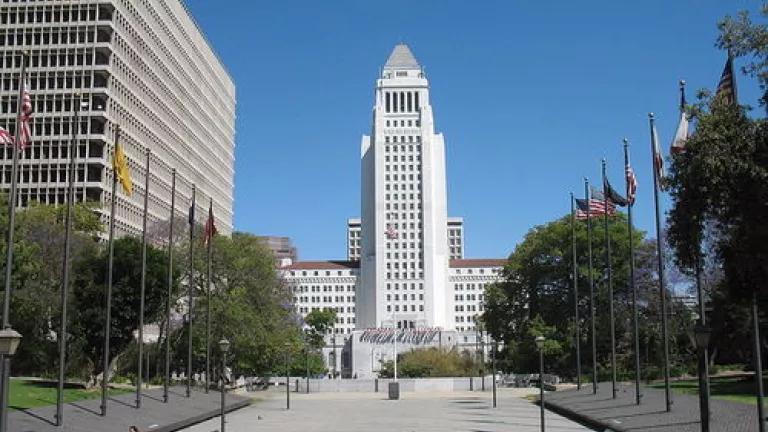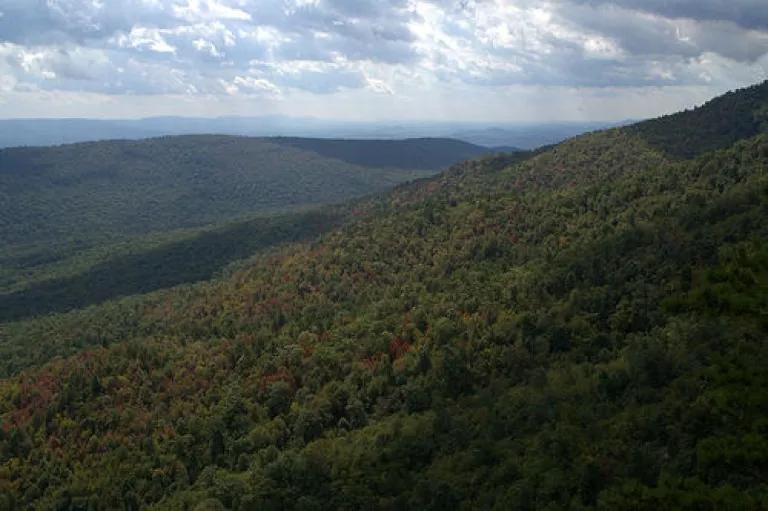
Every day, communities across the country are taking action to protect themselves against the harms of industrial fracking. These efforts are illustrated by events like the string of successful bans and moratoria that passed as ballot measures in Colorado’s last election and the recent passage of a stringent fracking ordinance in Dallas. While headlining actions don’t happen all the time, recently, a wave of such activity has been sweeping the nation. Here are a few highlights:
California
Late last month, the L.A. City Council agreed to draft new rules that would prohibit “well stimulation” techniques such as fracking and “acidizing” (another stranger-than-fiction method of extracting oil and gas that works by injecting chemicals such as hydrochloric and hydrofluoric acid into wells) until more stringent controls are imposed by state and federal governments. Although only about a tenth of all wells in L.A. use these techniques, community leaders want to ensure that the spread of these practices don’t come to harm the residents of the nation’s second largest city. (If you are surprised that anyone is fracking in L.A. at all, it may also surprise you to know that drillers are targeting urban areas all across the country—anywhere, really, where there are frackable deposits).
L.A. City Hall. Photo by Kjetil Ree.
Following suit, Carson, California—a city of nearly 100,000 people—placed an emergency moratorium this week on all new drilling, preventing efforts by drilling companies to drill more than 200 new wells next to local homes and a state university. The ban was driven by concerns that one company, Occidental Petroleum, would use fracking in the development of its new oil wells in the city. Although the company has promised not to employ fracking, residents are concerned by the lack of legal assurances that would hold the company to its word. As stated by Councilman Al Robles, the sponsor of the moratorium, “there are too many questions, too many unknowns . . . I refuse to gamble with the health and well-being of the residents.”
Colorado
The movement in Colorado to protect communities can be summed up in two words—direct democracy. As I’ve blogged about before, voters in four Colorado towns voted to approve fracking bans or moratoria last November. Although a recount in in Broomfield, CO was challenged, approval of the ban was upheld by the Colorado courts late last month.
The momentum, however, did not stop after election day. Earlier this year, the Colorado Community Rights Network submitted a ballot measure to the state that would create a new amendment to the Colorado Constitution that would codify the right of Colorado municipalities to limit or ban activities, such as fracking, that could harm local health, property, or the environment. The measure now goes back to the voters—86,105 valid signatures will need to be collected to put the initiative on the ballot.
Washington D.C.

George Washington National Forest. Photo by Aneta Kaluzna.
Joining numerous other city and county governments in Virginia and Maryland, the Washington D.C. City Council recently passed a resolution this month opposing fracking in the George Washington National Forest. The common-sense move comes not only out of concerns for the natural integrity of the pristine 1.1 million-acre forest, but also because the forest contains a significant portion of the headwaters of the Potomac River—D.C.’s sole source of drinking water. While the resolution is not binding, it adds the city to the chorus of voices opposing drilling in the forest, which also include D.C. and Fairfax water authorities and the U.S. Army Corps of Engineers.
New York, New Jersey, and Connecticut
Movement to ban the road spreading and unsafe disposal of fracking wastes that has gained traction in many New York counties has now spread to state legislatures in both New Jersey, and Connecticut. In the last few months, several bills were introduced in both state houses that would limit or prevent the use or disposal of such wastes. Although high volume horizontal fracking is not currently occurring in any of these three states, legislators are beginning to realize that the tremendous amount of fracking waste being generated by fracking in nearby Pennsylvania and West Virginia could still pose a risk locally. Where fracking waste—which contains a cocktail of dangerous chemicals and often radioactive materials— is used or disposed of improperly, it can find its way into drinking water supplies. And as my colleague, Kate Sinding, has eloquently put it, “nobody should have to find that in their water glass.”

